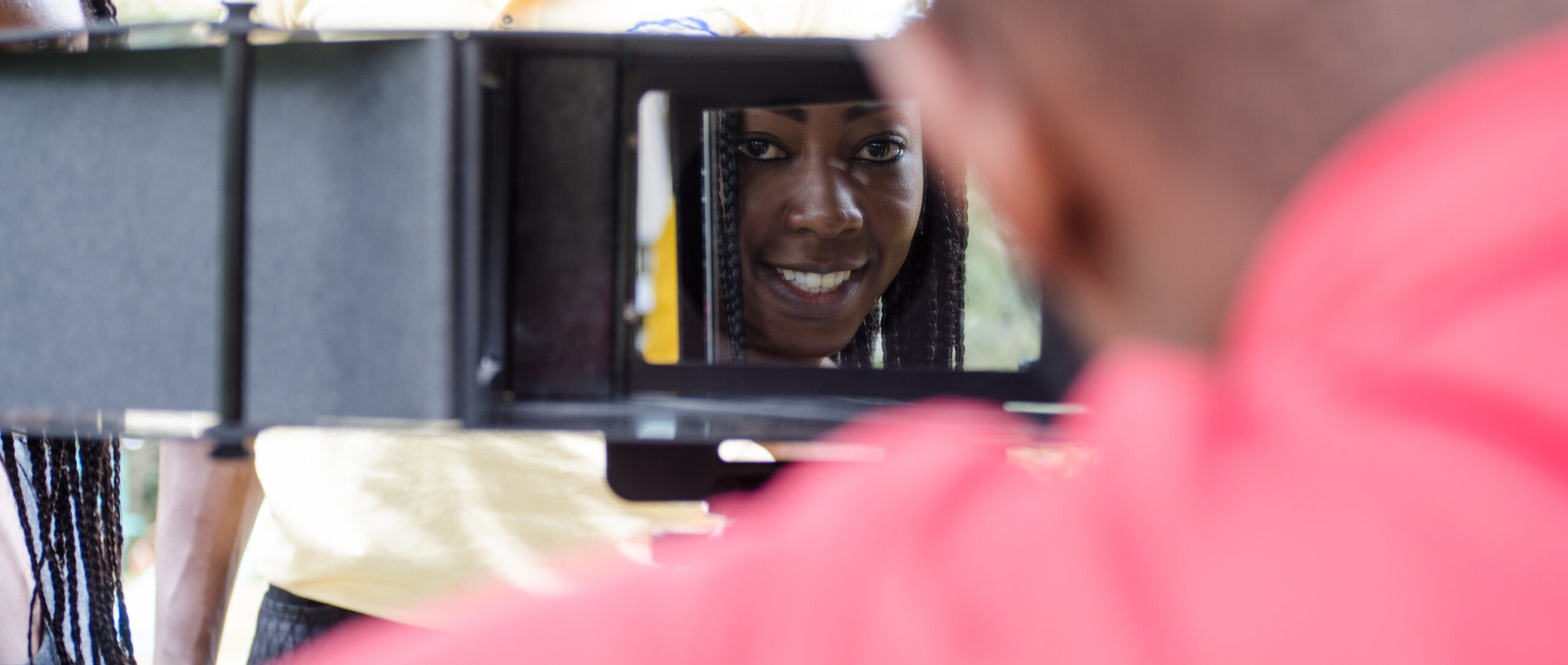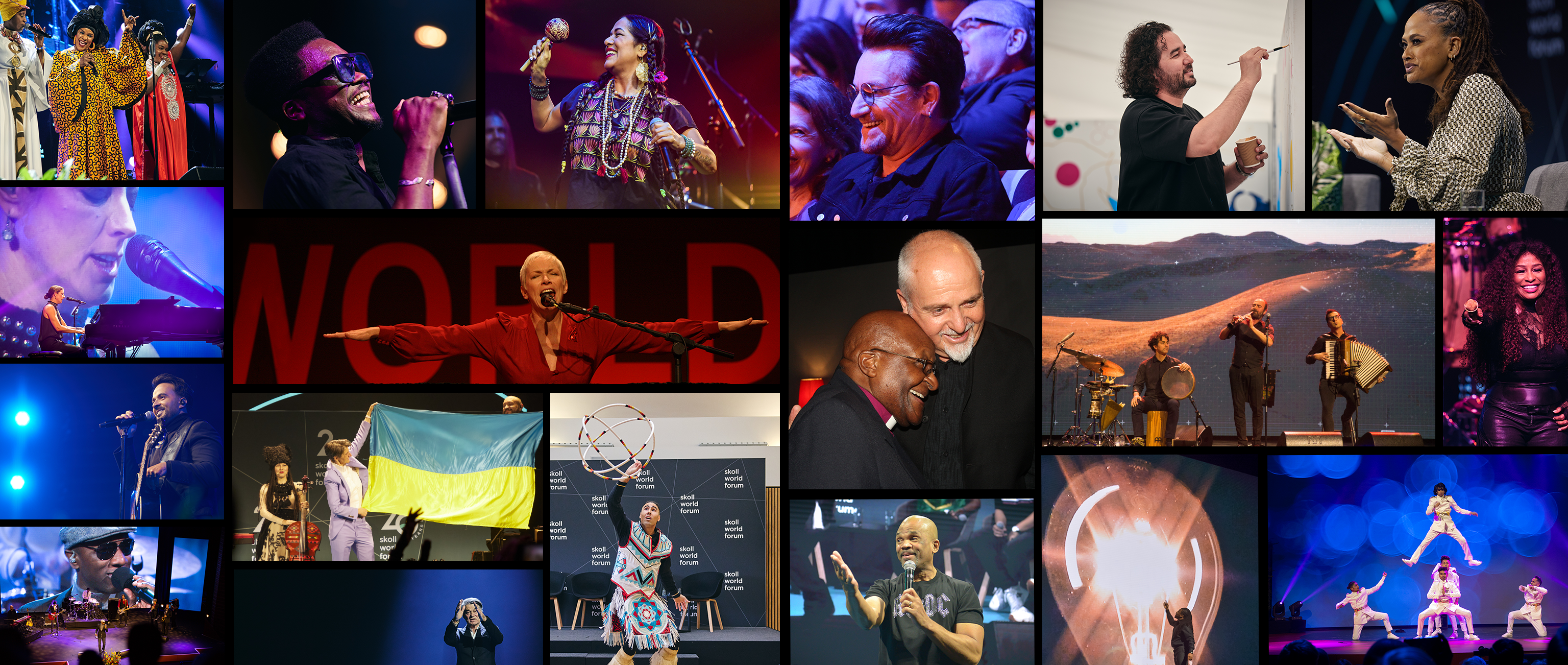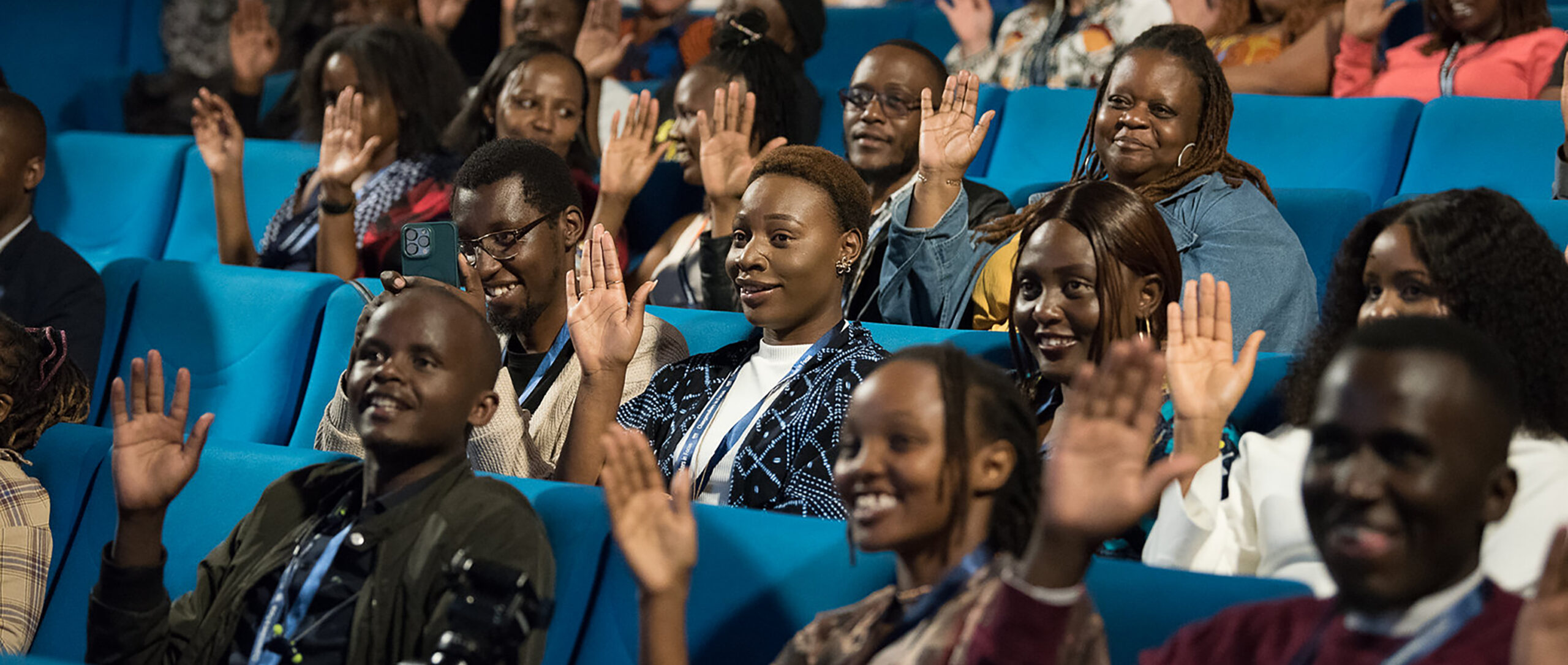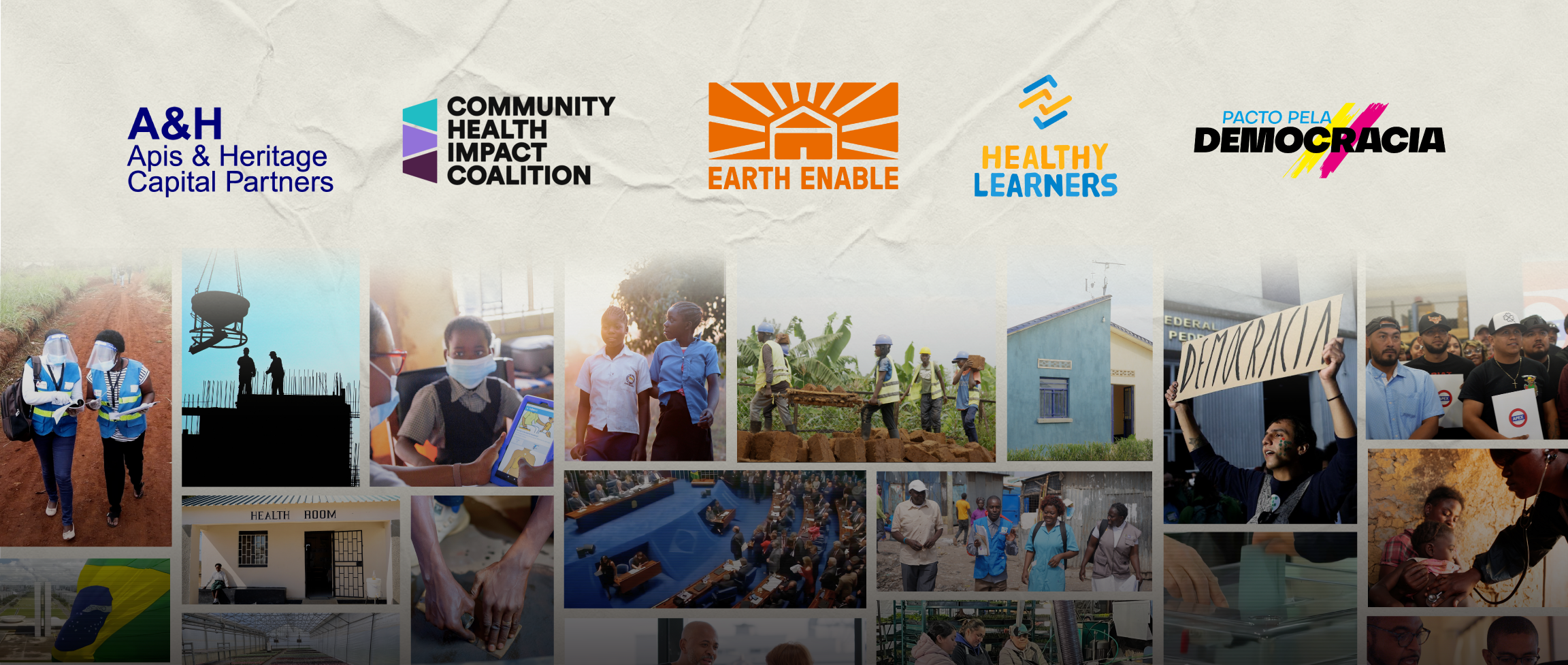Toward More Proximate Storytelling in Philanthropy
It’s an incredible honor to be entrusted to help tell someone’s story. The Skoll Foundation’s community of Awardees and grantees each have important, vital stories to share about their impact in the world. Storytelling has long been core to the Skoll Foundation’s approach to supporting social innovators, rooted in founder Jeff Skoll’s belief that a story well told has the power to inspire people and spur action to seek solutions to the world’s most pressing problems. The Skoll Foundation has always held that human-centered storytelling that elevates the voices of social innovators offers optimism and hope and helps to fuel transformational social change.
As we’ve developed our storytelling capacity as an organization, we’ve also been reflecting on the dynamics of our role behind the camera. Proximity is a core value for the Foundation, across all its initiatives: We trust those closest to the challenge to lead the change. We aim to support those most proximate to the problems, those crafting solutions in close partnership with the communities most impacted. In recent years, we’ve come to see that our commitment to storytelling too must lean further into these values. To that end, we’ve looked for ways to shift power and to engage in more proximate storytelling, both in our own direct work and by supporting efforts to transform the practices of others.
As a white male filmmaker at the Skoll Foundation, I have access to power, privilege, and a set of experiences that shape my world view. And I have blind spots and biases. The work of decolonizing storytelling in philanthropy has a deep personal resonance for me, and I find myself grappling with a growing set of troubling questions.
Is my very presence causing harm, regardless of how I show up? If I am present, how can I build trust with the film’s subjects so that the production experience, and the final project, do not feel extractive? Would it be better if I got out of the way, and allowed someone from a less represented group to do this work? How can we make more progress in hiring BIPOC and local filmmakers to collaborate on these projects? How does the white gaze show up in this work, and is it possible to mitigate?
Another critical lesson for me is that being aware of the problem, and my place in it is not enough. Calling it out is not enough. At the Skoll Foundation, we work to shift the funder-grantee power dynamics by approaching our storytelling as a collaborative editorial project alongside the grantee where they control how their work is best represented. We’re also working to shift the dynamics of storytelling through investments that:
- connect storytellers and civic leaders to create transformative impact
- support local filmmakers to tell stories of solutions within their communities
- disrupt and shift harmful narratives
Connecting storytellers and civic leaders to create transformative impact
The Skoll Foundation has partnered with the Ford and Compton Foundations to launch the International Resource for Impact and Storytelling (IRIS), a $30 million donor collaborative. IRIS will fund organizations, research, and creation of moving image content—including filmmaking, but also virtual reality, social media videos, and more—to create a collaborative network of proximate storytellers and civic leaders.
IRIS supports donor partners’ efforts to deepen collaboration between storytellers, movements, and civil society leaders, furthering the goals of dismantling inequality and making progress on key social justice issues. With emphasis on building knowledge and networks in Latin America, the Middle East, Africa, and South Asia, IRIS will also have activities in the US. Its approach will have four main focus areas:
- Supporting and protecting creators: developing resources, policies, and models for the safety and security of increasingly embattled independent moving image storytellers internationally.
- Bridging storytellers and frontline civic leaders: building new and better networks between socially engaged storytellers, civil society leaders, and communities whose stories need to be told and who can directly benefit from the telling.
- Creating effective narrative analysis to inform transformative storytelling: studying how entrenched cultural narratives undermine fairness, tolerance, and inclusion, and identifying frameworks to counter them.
- Diversifying storytelling approaches for greater impact: expanding genres for civically engaged storytelling and demonstrating how these stories reach, educate, and mobilize audiences using meaningful evidence frameworks.
To learn more about how to engage with the IRIS initiative, visit storyforimpact.io
Cara Mertes, founding Director of IRIS, talks about the initiative as an effort to help dismantle the “white gaze” that is so prevalent in social impact storytelling. “I think when you actually put resources into raising up voices that are not about a Western and a white gaze, then you’re doing something to break apart the dominant paradigm, which is very, very devastating for so many communities around the world in various ways,” Mertes recently told Devex. Funder collaboratives like IRIS are critical to deepen this work of shifting practices and investing in a new paradigm of proximate storytelling.
Supporting local filmmakers to tell the stories closer to their communities.
In partnership with Docubox, I had the opportunity to teach a workshop in Nairobi in 2019 for 18 emerging filmmakers from East Africa who wanted to increase their skills and connections in the business of social impact filmmaking. As part of that program, they fully produced four short documentaries about Skoll supported organizations working locally.
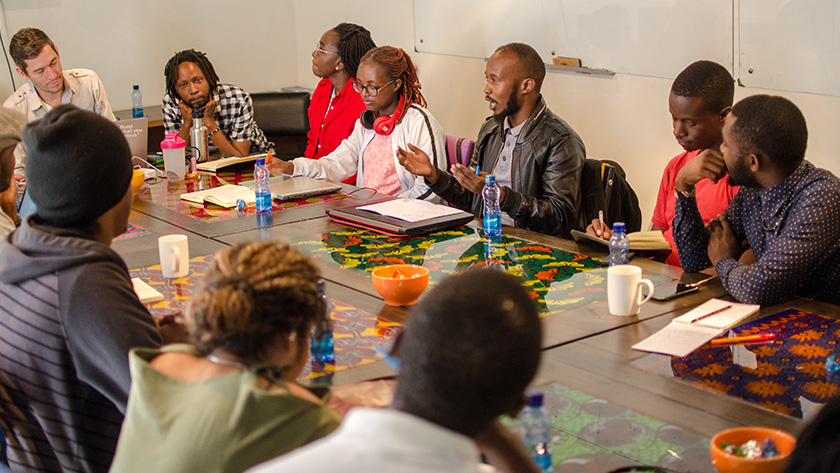
Tackling Malindi’s Dirty Secret looks at the efforts of Water and Sanitation for the Urban Poor (WSUP) to partner with city leaders in the coastal Kenyan town Malindi to create an ambitious citywide inclusive sanitation plan.
Safari Doctors tells the story of that organization’s partnership with Blue Ventures to create the “Pamoja Project” to engage young people in Lamu, Kenya around issues of population, health, and the environment.
Docubox’s mission is to enable talented, driven, and focused East African filmmakers, with important and unique stories to tell, to produce high impact independent documentary films that unearth new realities about worlds, identities, and people for audiences in East Africa and around the world. Like so many organizations, they needed a new video about their work, so the students collaborated to make this short film.
The B Lab movement has grown exponentially since receiving the Skoll Award in 2014. B Lab East Africa, one of its newer branches, support companies in the region committed to sustainable business models valuing people and the planet, while also generating a profit. This short film introduces the B Impact Assessment approach in East Africa.
In the years since our workshop in Nairobi, many of these filmmakers have built on this experience, expanded their networks, and gone on to complete other social impact film projects. Initiatives like this help to build a talent pipeline of proximate storytellers who funders can turn to.
Disrupting and shifting harmful narratives
The Skoll Foundation has also supported Africa No Filter (ANF), an innovative donor collaborative working to shift stereotypical and harmful narratives within and about Africa. Through research, grant making, and advocacy, ANF is building the field of narrative change makers on the African continent by supporting storytellers, investing in media platforms, and driving disruption campaigns.
Media research that ANF conducted shows the persistence of the harmful narrative that Africa is broken, ANF’s executive director Moky Makura recently told Quartz. The vast majority of stories surveyed by ANF tended to focus on conflict, crisis, and tragedy, overlooking stories of solutions. ANF is working towards an empowered narrative change ecosystem and an informed community of storytellers who work more deliberately to change harmful narratives within and about Africa.
Additional resources to support proximate storytelling
At the Skoll Foundation, we now work to hire local filmmakers for our projects whenever possible. Often this helps forge relationships between those filmmakers and the local organizations. There are a multitude of resources for people looking to hire editors and producers from underrepresented communities, see Brown Girls Doc Mafia and The Handy Foundation, for instance. Sites like Story Hunter, Upwork, and Production HUB can be useful for finding and hiring local freelancers directly. Another great resource is Ethical Storytelling, a community of nonprofit practitioners and storytellers working together to integrate a new standard of storytelling.
The Skoll Foundation’s community of grantees includes organizations creating media and crafting narrative that centers proximity and community-based storytelling. Pulso is a non-profit media start-up that shares news, history, and culture stories by Latinos, for Latinos. The artist-driven public discourse of For Freedoms works to increase direct action and creative civic engagement. Push Black uses the power of narrative, especially Black history and news, to educate and activate its subscribers to build their personal power and create lasting economic and political change.
The Redford Center supports a wide range of filmmakers working at the intersection of climate change and storytelling. Skoll Awardee Breakthrough recently released a series called “Our Stories In Vivid Color” featuring girls and gender-nonconforming youth of color as cultural influencers and leaders. The Skoll Foundation also supported BAYCAT to produce a series of PSAs to promote youth voting and the award-winning short film Blackness is Everything.
These grantees and other innovators in the Skoll community leverage narratives to shift attitudes and behaviors, to drive transformational social change. Alongside them, the Skoll Foundation’s journey towards more proximate storytelling will continue through partnerships and practices that strive to ensure that we center equity while helping to tell the stories that aim to upend inequity.
banner image: Mercy Muriuki practices interview set ups in the Docubox/Skoll Foundation “Filmmaking For Good” workshop in Nairobi, Kenya 2019″ (Gabriel Diamond)
Want more stories of transformational change on the world’s most pressing problems? Sign up for our monthly newsletter.
